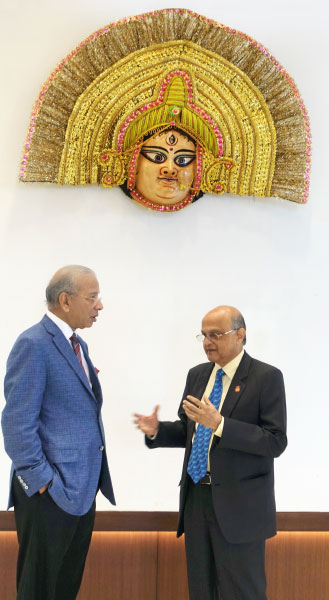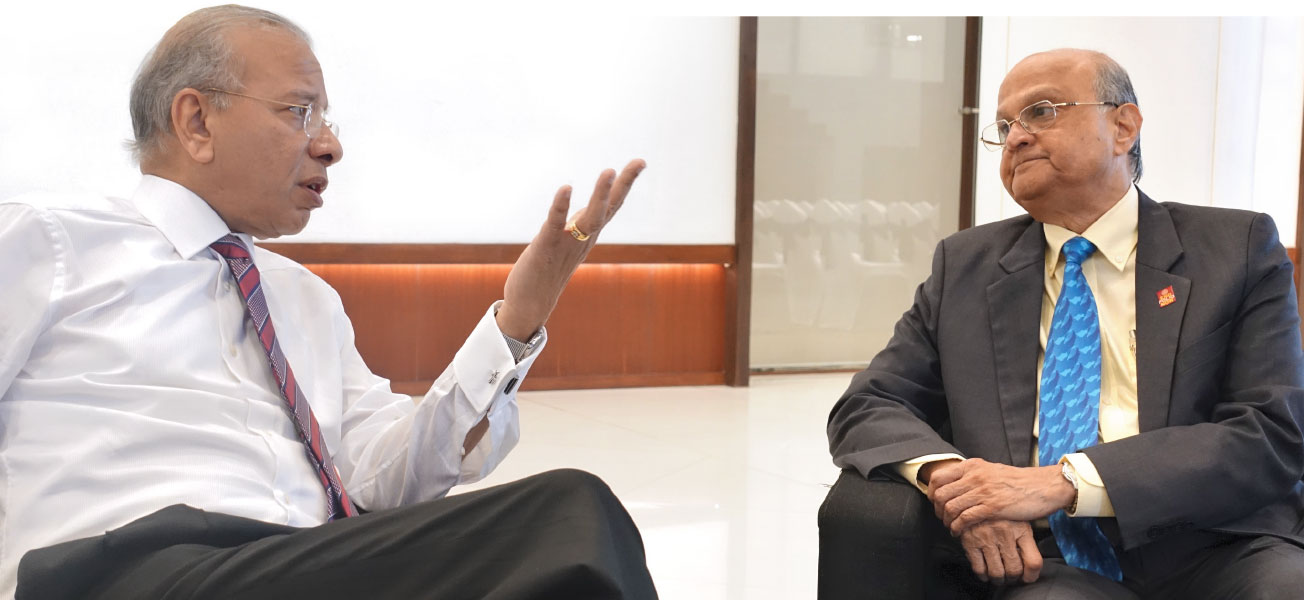When TRF helps Rotarians to create miracles Global Grants in India — A conversation with incoming TRF Trustee Chair K R Ravindran and Trustee Gulam Vahanvaty
At the Indore Zone Institute, a session that generated lot of interest and debate, pertained to global grants (GGs). Many expressed unhappiness over the rejection of their grant applications. The general feeling was that they weren’t given any reasons or explanation on why their grant applications were being rejected.
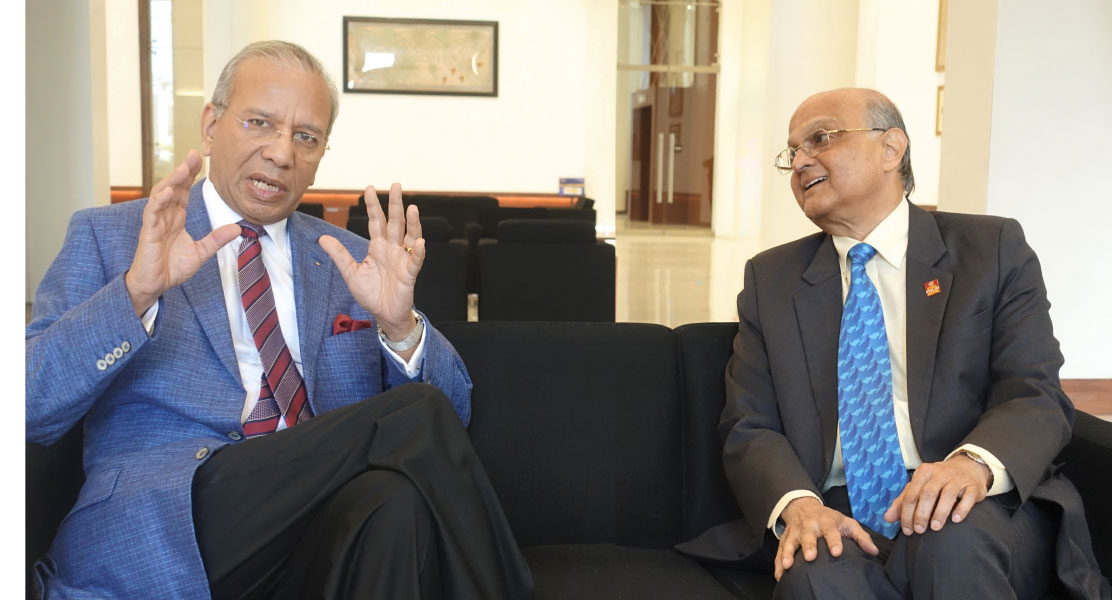
Incoming Trustee Chair K R Ravindran and General Secretary John Hewko, who were on the panel, addressed some of the concerns on the spot, and Ravindran promised to revert with answers to the questions raised within three months, with facts and figures pertaining to GGs.
Rotary News caught up with Ravindran, TRF Trustee Gulam Vahanvaty, and RI staff dealing with GGs Abby McNear and Meredith Burlew to find out why some GG applications work, while others don’t. Most important, what norms a club should follow to plan and execute an effective and successful project with the help of a GG that is speedily processed and approved.
The buzz in India these days is that Rotary India is the Kohinoor in the crown of RI, a sentiment first articulated by RI President Nominee Shekhar Mehta. He had said this in an interview to Rotary News in the context of Rotary in India topping the charts on membership, emerging second in TRF giving and doing great community service projects.
Asked to respond to the Kohinoor title and the service projects Indian Rotarians do, Ravindran says: “If we were to judge by the enthusiasm and results demonstrated through TRF activities of Indian clubs and districts, we would agree with him, without, of course, taking away any credit from the other big users of TRF.”
He says an analysis of “the big users of our GGs shows that India unequivocally leads the pack and in doing so, it more than contributes its mite to making this country a better place to live in. We can be proud of that.”
Here are the statistics the incoming Trustee Chair gives: In RY2019 (all years mentioned are Rotary years: July-June), India hosted 269 global grants worth $21,516,796 or (about ₹151 crore) in combined funding. England which hosted 101 global grants was a distant second.
“In analysing the nature of the grants, it is clear that a lot of funding goes to supply medical equipment (particularly for dialysis), toilets and equipment in schools. Last year, 44 projects were on basic education and literacy (BEL). But we must also note that of the 53 BEL projects TRF declined worldwide in 2019, 33 were sponsored by India.”
In 2018, the Foundation approved 95 per cent of GG applications; in 2019, after the Foundation asked that applicants to share the results of their community assessments, that number dropped to 89 per cent and this year it stands at 85 per cent. While an 85 per cent approval rate is incredibly high for any foundation, it is down from the previous high of 95 per cent, he adds.
So how and why did that happen, I ask Ravindran. “Our study of projects which were rejected had a common thread. Instead of community assessment guiding the design of their project, our Rotarians frequently look to reach the greatest number of beneficiaries possible. While understandable, this practice can lead to implementation issues stemming from a lack of project planning and oversight.”
Trustee Vahanvaty adds that the strongest projects were those that had “robust community assessments and strong Rotarian participation, including the active involvement of club or district members beyond the primary contact.”
Ravindran likes to refer to Rotary as a business and as RI President he had focused a lot of his time and energy on reducing operational costs and had succeeded substantially. Asked to explain why he equates Rotary’s work akin to running a business, he says, “Yes, it is indeed a business, but like no other. Our business is literacy and health. Our business is livelihood and hope. Our business is life itself — and to so many of those we help, our business is the business of miracles.
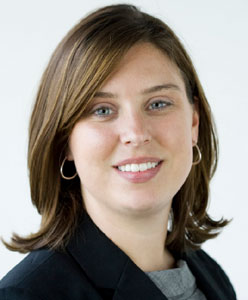
“Let’s say we are building a petrol pump on a highway location. We will first assess the quantum of traffic on that highway.” The questions that need asking are: Where is the closest petrol bunk? Is diesel or petrol more popular and accordingly how many pumps are required? What about storage of fuel? The pump attendants need to be trained and the office manager taught about reordering levels, cash collections, etc.
“But we would not simply build a petrol pump because it looked good and might serve someone who requires petrol or diesel one day, and hope that it works!
Why should it be any different in a Rotary project?
“Our study showed that grant management issues were most common when Rotarians did not conduct a community assessment to determine the beneficiaries’ priority needs, or did not involve the beneficiary community in project planning. We looked for a real example as to what happens when Rotarians do not conduct a proper community assessment.”
Our business is life itself — and to so many of those we help, our business is the business of miracles.
– K R Ravindran, Trustee Chair-elect, The Rotary Foundation
Asked what this study found, Trustee Vahanvaty says, “We discussed with Meredith Burlew, who heads TRF’s Stewardship Department. Meredith works closely with our cadre members and has been with TRF for over 13 years, has been Rotary’s stewardship manager since 2012, and has reviewed over 300 audits of Rotary grants. She was present in Kolkata earlier this year at the DISHA programme where she shared some examples collected from over 40 audits that were completed within the year, most of which were well executed.”
One project she did mention was approved to provide clean water to schools. She pointed out that it was primarily vendor-driven; Rotarians distributed filters designed for home use to schools that in some cases had over 800 children. The filters were the same at every school, regardless of school size or input water quality. “Many of these systems failed, and precious Foundation funds were wasted and Rotary’s name was sullied due to the poor project quality.”
Rotarians have often told us that in a country like India, one toilet in a school is better than no toilet; The Trustees deem that if a school needs seven toilets then building one will not suffice.
– Gulam Vahanvaty, TRF Trustee
In another project, a district secured a grant for its clubs to provide a large number of metal school benches to numerous schools. In some cases, the benches were far too large for the small children they were intended to benefit. “They became rusty and their sharp edges proved a hazard. Ultimately, the teachers removed them from the classrooms. Once again, precious Foundation resources were wasted and Rotary’s reputation suffered, all for the lack of the simplest community assessment,” says Vahanvaty.
In yet another example, a district secured a grant for its clubs to install incinerators for sanitary napkins. The clubs had no understanding of the project and the incinerators were either installed in a primary school where there was no need, or worse, placed adjacent to the toilets where children could be burned from the hot metal. The smoke from the burning plastic that spewed from these incinerators sullied the air.
Being able to say ‘we gave some equipment to 100 schools’ is not the same as saying, ‘Thanks to Rotary, the children’s reading comprehension has risen 10 per cent and attendance is at an all-time high.
– Abby McNear, Director of Grants, TRF
“The Foundation should not be involved in projects like these. It wastes the limited funds donors have given for global grants and does nothing for Rotary’s reputation. We can, and we must do better,” adds Vahanvaty.
There is also the philosophical difference between what the Trustees deem fit and some calls that are made by districts, says Ravindran. “Rotarians have often told us that in a country like India, one toilet in a school is better than no toilet; But in safeguarding funds collected from around the world for GGs, Trustees do not subscribe to that view. The Trustees deem that if a school needs seven toilets then building one will not suffice. They believe that one toilet would probably become unusable in a few days and the users will simply return to their old habits. If a class needs 10 benches and bunks, two won’t do and so forth.”
However, he adds, if district grants are the finance source, then clearly TRF has no proprietary right over it and it becomes the district’s own decision.
Adds Vahanvaty, “It is our Centennial year. Let’s do what we must to have our GGs work and show Rotary at its best.”
Pictures by Rasheeda Bhagat
Well-planned and well-executed Global Grants
Against every negative or a GG going wrong, there are several that are planned and executed well. As Trustee Vahanvaty adds, “The ‘bad’ examples are being shared here so that we may learn from them. The ‘good’ projects far outnumber the bad. To quote these good examples, Rotary News caught up with Abby McNear, Director of Grants in Evanston, to get an insight on what really works in global grants.
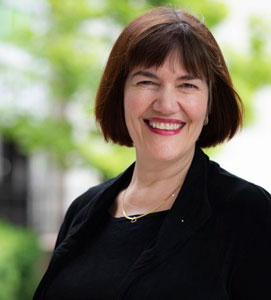
Director of Grants, TRF
Abby said that a lot of problems stem from “how we approach projects in schools. Over and over, the Foundation sees projects where the primary goal is to supply equipment to the largest number of schools possible. Nowhere in the Trustees’ BEL policy statement or WASH policy statement, will you see a goal focused exclusively on providing equipment.”
This approach to designing projects works in a district grant context, but is absolutely at odds with the eligibility criteria for GGs, “which are the Foundation’s showcase projects. They are meant to be transformative with measurable improvements for the beneficiaries. Being able to say ‘we gave some equipment to 100 schools’ is not the same as saying, ‘Thanks to Rotary, the children’s reading comprehension has risen 10 per cent and attendance is at an all-time high.’ You can do the former project without a community assessment. The latter will never happen unless one is done.”
Asked to give examples of a good GG project, she said, “The Rotary Clubs of Bombay (RID 3141), RC Thane Hills (RID 3142) and Colombo (RID 3220) partnered together on a GG to provide professional development to the principals, education officers and teachers at 100 schools in Thane. By focusing on these professionals, the clubs knew that the 24,000 children who attend school in Thane would ultimately benefit.”
She gave two other examples of GGs that went smoothly as they satisfied all criteria laid down by the Trustees.
One was sponsored by RC Madras South (RID 3232) and RC Pasadena (RID 5300). Its objective was to do about 230 corrective heart surgeries and follow up care for beneficiaries at the Sooriya Hospital in Chennai. It aimed to address the paediatric cardio surgery needs of poor children and help them lead a healthy life.
The project assured an end-to-end solution for parents whose children had been diagnosed with congenital heart disease. The surgeries performed at Sooriya Hospital and supported by the two Rotary clubs were not just more affordable and accessible than many others in the market, but also ended up being free of cost to the family.
The project aimed, and turned out to be, “a breath of fresh air and a reassuring safety blanket to families in need of support to help save their children.”
Another global grant that satisfied all TRF criteria and worked was for a WASH in Schools project to provide hygiene education training to students and teachers and build toilet blocks in eight schools in Jodhpur. Sponsored by RC Jodhpur Padmini (RID 3053) and RC Bentonville (RID 6110), US, the objective of this project was to make sustainable improvements in the sanitation and hygiene of eight schools in this Rajasthan city, benefitting nearly 2,000 students. It aimed to build new handwash stations, utensil wash stations, drinking water stations and upgrade toilet blocks for boys and girls.
The project also provided sanitary napkins and training on menstruation to about 630 girls from Class 6 onwards, established a maintenance system for the facilities, conducted sanitation and hygiene training. It benefitted primary and secondary government-run schools attended by underprivileged students. The upgraded facilities provided a better educational and more sanitary environment, and the training set in behavioural changes by creating awareness in students and faculty, and contributed to the retention of students, especially girls.
A year prior to the project, RC Jodhpur Padmini club members visited 30 government schools to survey the prevalent conditions. In addition, the club undertook numerous service projects, including hygiene training, in the government schools during the previous five years. Through these projects and the visits to these schools, the club identified the need for improved sanitation and hygiene education and infrastructure and zeroed in on the eight schools for this project.
The school staff and students shared their problems during club members’ visits to the schools. The schools were very receptive and enthusiastic about the contributions the club had already made during the past five years through various service projects and responded warmly to this opportunity to improve their sanitation and hygiene infrastructure and practices, said Abby.
So, successful global grant projects at a large number of schools can be done, but it means “thinking big in terms of the project’s goals and focusing on better educated children as opposed to simply providing equipment. It’s all about the project goals.”
So where do we go from here?
Abby responds: “Lots of help is available. Grants staff can pre-review your project ideas and offer advice. They can also connect you with a local cadre member for help. The Foundation has guidelines for GG projects in every area of focus, but the BEL guidelines for GG funding are the most helpful for school projects.”

